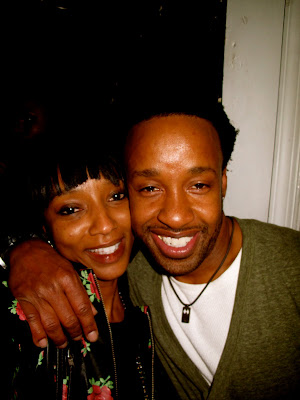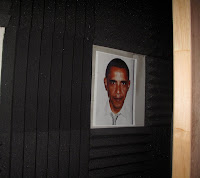 I am living in Philadelphia and I need an assistant to help me with all sorts of things!!! I am very excited and a bit overwhelmed with keeping up with my shows,writing new tunes and all the things that come with having a real web presence! So I am aggressively looking for an assistant that is male or female, music lover/researcher, owns a laptop, digital camera or HD video cam, has a strong knowledge of social media and has time to be on the computer for a few hours a week There a few other things that I will need but we can meet and talk about that later...If you or anyone you know is currently living/working in the Philadelphia area...I would LOVE to meet them.ASAP! Please leave your contact info and a resume if you have one to
I am living in Philadelphia and I need an assistant to help me with all sorts of things!!! I am very excited and a bit overwhelmed with keeping up with my shows,writing new tunes and all the things that come with having a real web presence! So I am aggressively looking for an assistant that is male or female, music lover/researcher, owns a laptop, digital camera or HD video cam, has a strong knowledge of social media and has time to be on the computer for a few hours a week There a few other things that I will need but we can meet and talk about that later...If you or anyone you know is currently living/working in the Philadelphia area...I would LOVE to meet them.ASAP! Please leave your contact info and a resume if you have one to
She attended an all-girls catholic school and was prematurely submerged into classical music, mastering opera and performing Italian arias by the age of 14. If we are to remember RES for her solo debut 'How I Do', 'Golden Boys' was the track to drum her onto the scene back in 2001, intertwining folk, acoustic rock with hip hop and soul. She survived the death of MCA and was adopted by Geffen Records, but later dropped the label after finding herself shelved to be forgotten. This now brings us to her 2010 innovations. One: Idle Warship is the identity to her duo group with Talib himself, plus Two: her indie comeback sophomore album Black.Girls.Rock.
'Reflection Eternal' by Talib & Hi-Tek must be one of the most rated hip hop albums and collaboration projects of all time. Do you feel this project enriched &/or chose your current direction? Why?
I love what Talib and Hi-Tek do together. They have a chemistry that’s just crazy! They were on of the first groups that collaborated with me, early in my career. I truly believe that all the work I’ve done in my career as well as all the music that I ever listen to have influenced my life as well as the direction of music I go into for the future. I am what I experience.
Describe the topics of the Black.Girls.Rock albumin six words.
Brave, personal, honest, rare, real music.
Since 1999, Talib has featured you on multiple projects. How did the Idle Warship concept come about and would you say the group’s sound roots more from your vision than his? Is Idle Warship an independent concept or a major label driven idea?
The concept for the album came about because of what was going on around us at the time of its inception. We wrote a story about a girl from a small town who wants to be “everything she sees on TV”. It’s a fictional story based on real life. Idle Warship is very much an independent concept; Kweli and I are hands on as you can get from making the album, to booking shows as well as our web presence.
How hard is it to be a female artist, in such a male-driven industry? What aspects do you avoid or overcome?
It’s no harder than being a woman in a Fortune 500 company! In other words, it’s extremely hard, to say the least. Let me put it like this, not too many men like having a woman boss in any career. So I deal with a lot of insecurities as well as the labels that strong women get attached to. On the other hand, as a woman it makes me stronger than my male counterpart and at times it is recognized and rewarded.
How did you feel about Geffen picking and holding you and the other selected artists from the late MCA as trophies, and then, not pushing your music? Did you see other former MCA names come forward, and you be put back? Or was the whole transition from label to label an empty promise?
I don’t think it’s fair to have a contract with anyone and not do your end of the bargain, which happens a lot, but it’s part of business and no matter what I know, nothing is guaranteed. I did see some artists come, record an album and release as well as other artists’ record and get let go. The transition for me was not completely an empty promise, I did record an album and mix it and master it, but it was not released. Although I would have loved for Geffen to put that album out and support it like MCA did my debut, I feel that was my destiny and I’m not bitter towards them or anyone else. I learned a valuable lesson and made great music.
You commenced in the industry when music still sold CD albums. Do you appreciate music now being so widely available to stream and download? Or do you miss the days of unwrapping packaging and Discmans? Why?
I definitely miss the days of music being sold in record store. It’s sad to walk by a store that sells what you make and, to see that it’s closing down, without plans of ever re-opening. At the same time, I do like the idea of having my music available to so many at the click of a button. It’s a double-edge sword.
What artists old and new do you listen to on a daily basis?
Cocteau Twins, Marvin Gaye, Talib Kweli, KT Tunstall, Ab Liva, Sade.
Other than music, what are your passions?
Photography, travelling, tennis and my family.
Would you ever go back to your opera days for good?
No. The classical training I received taught me how to sing properly without damaging my voice. It also taught me discipline and pronunciation when singing.
I love classical music and I haven’t thought about doing it professionally ever. I believe I’m right where I’m supposed to be at the moment.
Your sounds broadly range. If you were to be put in one category, what would you choose rock or hip-hop? Why?
I would choose alternative R&B, because when I listen to what I do, that’s what I think it sounds like, but I don’t mind being labelled anything. The label determines what music I make and never will.
Can Europe expect a RES visit/ show soon?
I am working on gaining contacts overseas, so I can perform and showcase what I do. I love to travel and have been to Europe many times, now it’s time to not just sightsee but to perform.














































